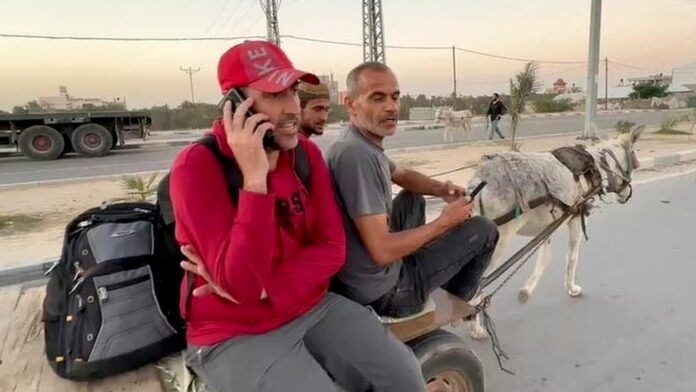Two British nationals and dependants of two others have been prevented from leaving Gaza with their families to flee the war between Hamas and Israel.
Abdalrahman Alharazin, an interpreter from London, said his pregnant wife and three children were able to cross into Egypt at Rafah as their names were on an approved list of foreign nationals.
His name was not, though, and he waited almost three days at the Egyptian side.
Ahmed Sabra, a doctor from Swansea, is stuck in the same situation.
Like Mr Alharazin, he was separated from his wife and three children after officials on the Palestinian side of the border allowed him to accompany them to the Egyptian side.
The two dependants, who have not been named, are the wives of British men who were allowed to cross into Egypt. One of the women is a doctor and the mother of two British children.
“I am really in shock, because I was in safety for 72 hours,” Mr Alharazin told the BBC on Wednesday. “I was expecting someone to help me and my kids, who are in tears, and my wife who needs a hospital. I thought someone would really look at us with mercy.”
The UK government said it would not comment on specific cases, but that it was working round the clock to help.
More than 150 of the estimated 200 British nationals who were in Gaza when the war began have been allowed to cross into Egypt since the Rafah crossing was reopened for foreign passport holders and seriously injured Palestinians a week ago.
Israel has been bombarding Gaza for a month and launched a major ground offensive over a week ago in response to an attack by Hamas gunmen on 7 October, in which 1,400 people were killed and 240 others taken hostage.
Gaza’s Hamas-run health ministry says more than 10,500 people have been killed in the territory since then, while the UN warns that a humanitarian catastrophe is unfolding.
More on Israel-Gaza war
Mr Alharazin told the BBC that he had travelled to Gaza four months ago along with his wife and their three sons – Ibrahim, 10, Yousef, 7, and Mohammed, 6.
They fled the Shejaiya area east of Gaza City on 13 October, after the Israeli military told the 1.1 million people in the north to flee southwards for their own safety.
The family slept in a makeshift shelter at a UN-run school until 4 November, when the names of Mr Alharazin’s wife and children appeared on a list of foreign passport holders who had been cleared to leave Gaza by Egyptian and Israeli authorities.
They then moved to an area near the Egyptian border and waited until Monday, when crossings through Rafah resumed following a two-day suspension.
Mr Alharazin said Palestinian officials allowed him to accompany his family to the arrivals hall on the Egyptian side of the crossing even though his name was not also on the approved list.
“The Palestinians told me: ‘You should go with your wife and kids. And hopefully you will get across to Egypt.’
“We managed to get inside. But in Egypt, obviously, they said: ‘Your name is not on the list. You have to wait here until the embassy puts you on the list.'”
“So we waited for two-and-a-half days,” he added. “And this morning they told us: ‘Sorry, your embassy didn’t do what it’s supposed to do. And we are sending you back to Gaza.'”
Mr Alharazin said he did not understand why the UK had allowed four families to be separated.
Now, he has to find refuge again in what he described as “the most dangerous area on Earth right now”.
“I am very fearful of my life,” he said. “This is an appeal to please get us out of here.”
Dr Sabra told the BBC that he and his family had arrived in Gaza to visit relatives only three days before the war began, and that they had spent three weeks waiting near Rafah.
He was similarly refused permission to enter Egypt with his wife and three children after being allowed through the crossing by Palestinian officials.
“[We] arrived on the Egyptian side and we just let out a big sigh of relief. We thought we [had] made it to safety, only to be told: ‘No, your father has to go back.'”
He added: “We were waiting on the Egyptian side of the border for the British embassy [in Cairo] to do their job, but unfortunately this did not materialise.”

Dr Sabra said being forced to return to Gaza was like being given a “death sentence” and accused the UK of not doing enough to protect its citizens.
“Just because I am of Palestinian origin, I am not as equal as any other human. I didn’t want to say this, but this is the reality. It is a disgrace,” he complained.
Dr Sabra and Mr Alharazin said their families had both finally found safety in Cairo.
A spokesperson for the UK Foreign, Commonwealth and Development Office said it was “working round the clock to ensure all British nationals in Gaza who want to leave are able to”.
“This involves submitting all details of British nationals and eligible dependants to the Israeli and Egyptian authorities. The authorities then review all cases and give permissions to cross.”
“We remain in regular contact with British nationals in Gaza to provide them with the latest information, and UK teams are forward deployed to the border to receive anyone leaving.”


